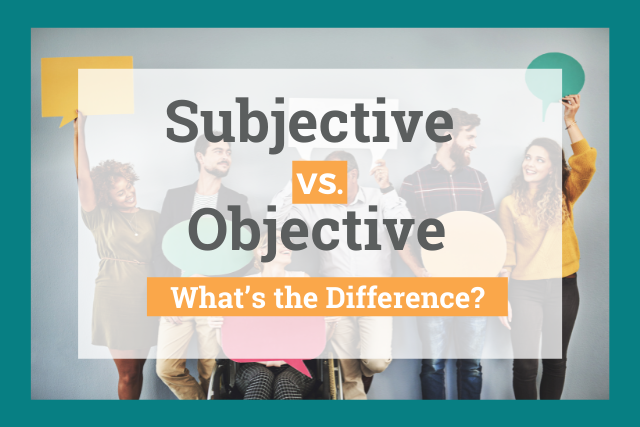
If you’re trying to write a strong essay or story, it’s often important to understand the difference between subjective and objective truth.
What exactly do the words subjective and objective mean, and when should you use each?
This article will explain the difference between the two words, provide examples of how they’re used in a sentence, and discuss whether you should look for objective or subjective information to support your own writing.
- What’s the Difference Between Subjective vs. Objective?
- How Would You Use Objective and Subjective in a Sentence?
- What Are Some Examples of Objective Statements?
- What Are Some Examples of Subjective Information?
- How Can You Tell if Something Is Objective or Subjective?
- What Is an Objective Opinion?
- Are Impartial Facts Better Than Personal Feelings?
What’s the Difference Between Subjective vs. Objective?
The difference between objective and subjective is related to the difference between facts and opinions.
The word objective describes information that’s based on verifiable facts. Objective truth can be verified by a third party, regardless of who the third party is.
For example, the sentence “The temperature outside is around 10°C” is an objective statement, because that statement will be equally true no matter who says it. Anybody in the world with a working thermometer could verify this statement.
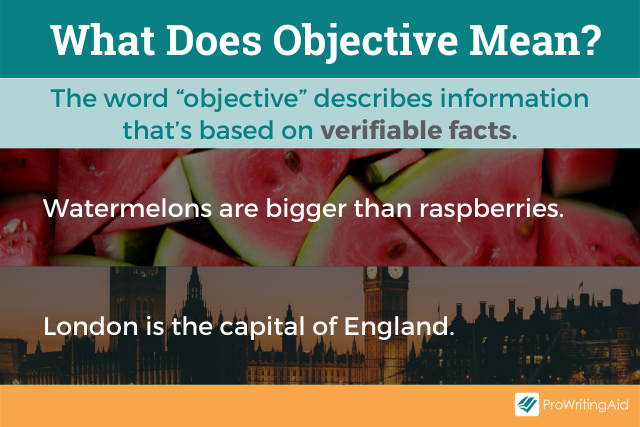
The word subjective is the exact opposite; it describes information that’s based on personal opinion or personal interpretation.
Subjective truth might be different for different people, depending on their own tastes, preferences, or experiences.
The sentence “It’s very cold outside” is a subjective statement, because how true this sentence is depends on personal opinions and experiences.
Many temperatures would feel very cold to someone who grew up in Arizona, but comfortably warm to someone who grew up in Alaska.
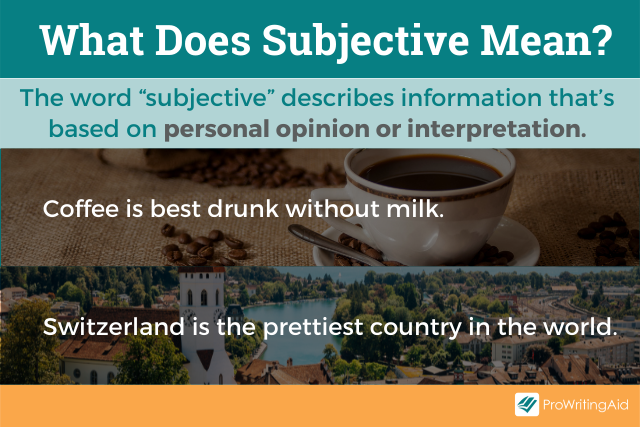
One easy way to remember the difference between the two words is to remember that “objective” sounds like “object.”
Objective facts are as concrete as the objects you can touch, like your desk, your bike, or your water bottle.
Subjective facts, on the other hand, pertain to more abstract concepts, like beauty, joy, or discomfort.
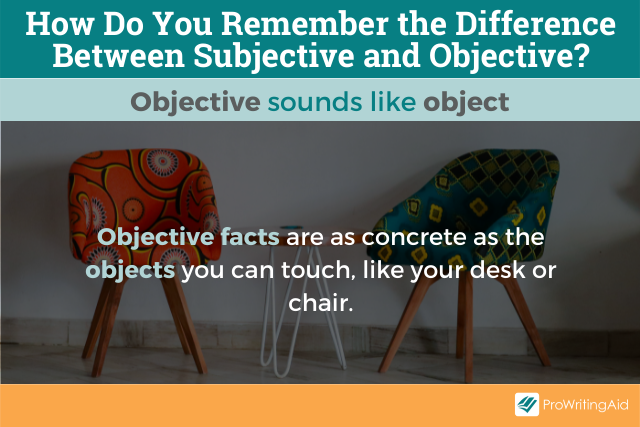
How Would You Use Objective and Subjective in a Sentence?
Here’s an example of a sentence that uses both objective and subjective in context:
"But now we, as pathologists, need more objective measures because symptoms, to a certain degree, are subjective." (Time)
This sentence, a quote from a pathologist, argues that symptoms of diseases are somewhat subjective because they differ from person to person.
One patient with the flu might feel horribly nauseous, while another patient with the same flu might feel only a mild cough.
As a result, it’s useful for doctors to have objective tools to determine how ill people are, which don’t have results that vary from person to person.
That way, they can track the way a disease spreads even if not all patients feel the same symptoms.

Let’s look at another example.
"We take our unruly, subjective feelings about a year of television and groom them into something that looks mathematical and objective." (Slate)
This sentence, a quote from a TV critic, argues that trying to rank TV shows is a meaningless task.
Every viewer has different tastes; some might love lighthearted sitcoms, while others prefer serious dramas.
There’s no objective way for a TV critic to determine a Top 10 list that applies to everybody, because everyone’s tastes and enjoyment levels are inherently subjective.
What Are Some Examples of Objective Statements?
If what you’re writing can be proven or disproven by evidence, it’s an objective statement. Likewise, if you include a reference to an study or an experiment, it is an objective statement.
Remember to always reference information like this. ProWritingAid’s Plagiarism Checker can ensure that you never inadvertently pass off someone else’s work as your own.
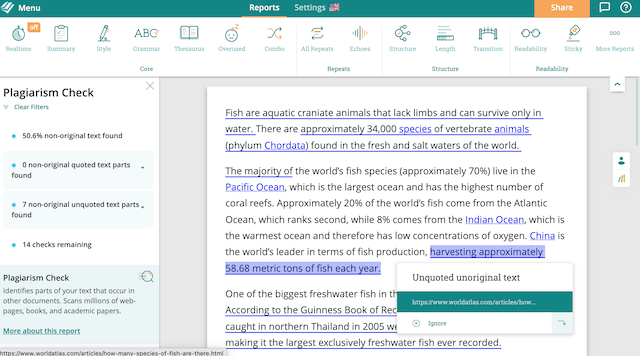
Find out more about Plagiarism Checks.
Here are some examples of objective information:
- The largest freshwater fish ever caught was 646 pounds. (Cite- Brittanica)
- Abraham Lincoln was the sixteenth president of the United States.
- The World Health Organization declared COVID-19 a pandemic on March 11, 2020.
- I have eaten the plums that were in the icebox.
Keep in mind that those statements would still be considered objective even if they were false.
It’s a common mistake to assume that “objective” is synonymous with “true,” but lies can be objective statements, too. The statement remains objective as long as it doesn’t depend on feelings or opinions.
For example, if William Carlos Williams had written “I didn’t eat any of the plums that were in the icebox,” even though he actually did, that would still qualify as an objective statement.
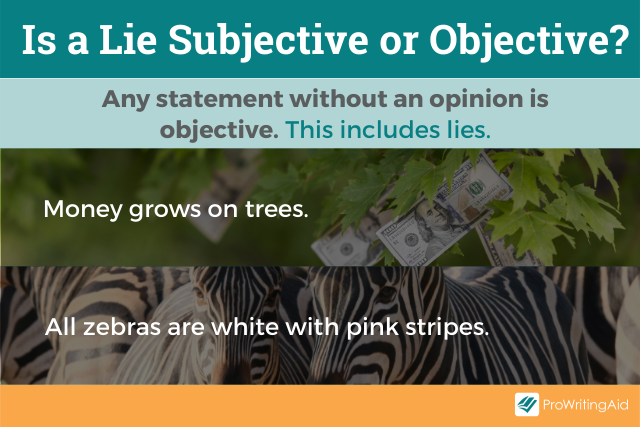
Here are some examples of false objective statements:
- Abraham Lincoln was the first president of the United States.
- The World Health Organization has never issued an official statement about COVID-19.
- I didn’t eat any of the plums that were in the icebox.
What Are Some Examples of Subjective Information?
If a statement relies on personal feelings or beliefs, it’s likely to be subjective.
Here are some examples of subjective statements:
- It feels very warm outside.
- Dogs are better than cats.
- The plums in the icebox tasted delicious.
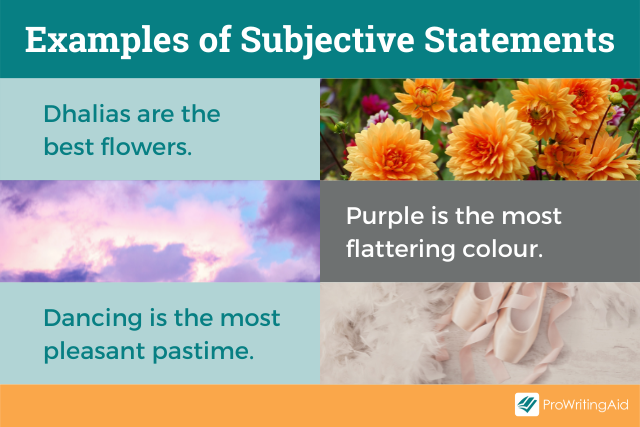
Watch out for subjective information that’s disguised as objective analysis. For example, a newspaper headline that says “New Study Shows That Dogs Are 85% Better Than Cats” sounds like an objective fact. However, because it depends on personal preferences and opinions, it’s still a subjective statement.
Here are some subjective statements that are disguised to sound like objective statements:
- It is objectively very warm outside.
- A new study shows that dogs are 85% better than cats.
- Plums in iceboxes taste ten times better than plums that are left in the heat.
How Can You Tell if Something Is Objective or Subjective?
If you’re not sure whether a statement is objective or subjective, here are some useful questions you can ask yourself.
To determine whether a statement is objective, ask:
- Is this statement based on factual evidence?
- Is there a way a scientist could test this statement to figure out if it’s true or false?
- Would a robot without any concept of human emotion be able to say this statement?
If the answers to any of the above questions are “yes,” you’re probably dealing with an objective statement.
To determine whether a statement is subjective, ask:
- Is this statement based on someone’s feelings, preferences, or personal tastes?
- Is it impossible to determine whether this statement is true or false?
- Does this statement make a judgement about something (e.g. good or bad, right or wrong, beautiful or ugly)?
If the answers to any of the above questions are “yes,” you’re probably dealing with a subjective statement.
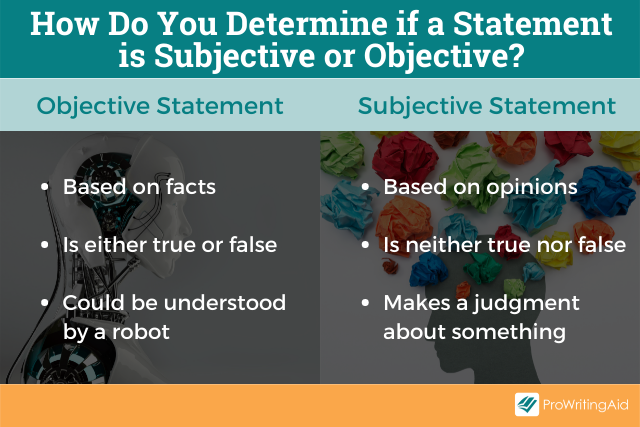
You can also look at the source of the statement to help you figure out how objective it is.
Sources like peer-reviewed scientific articles and unbiased news articles tend to contain more objective material.
Sources like opinion pieces and creative non-fiction tend to contain more subjective material.
What Is an Objective Opinion?
The phrase "objective opinion" might seem counterintuitive, since these two words are essentially opposites.
In this context, the word "objective" means unbiased and impartial, rather than factual. This is also true for the phrase "objective assessment."
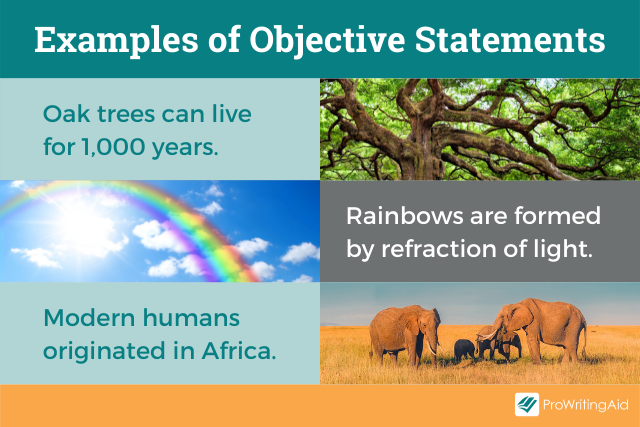
For example, you might ask a friend for an objective opinion about whether or not you should break up with your boyfriend.
In this scenario, your friend can’t give you objective advice if they have a personal reason for wanting you to make this decision, such as if they’re secretly in love with your boyfriend too.
Are Impartial Facts Better Than Personal Feelings?
Whether you should use subjective or objective statements depends on what your goal is.
If you’re writing a persuasive essay, you’ll usually need factual or quantitative data to make your writing credible. It’s important to search for objective facts from a reliable and impartial source.
On the other hand, you can also make use of subjective evidence, such as personal anecdotes. If you’re writing a persuasive essay about why bullying is wrong, a heartfelt story from the perspective of someone who’s been bullied might touch more readers than impersonal facts.
Most strong essays make use of both subjective and objective truth.
Final Words on the Difference Between Subjective vs. Objective
There you have it: a comprehensive guide to the difference between subjective and objective statements. Which examples did you find most helpful? Let us know in the comments.


